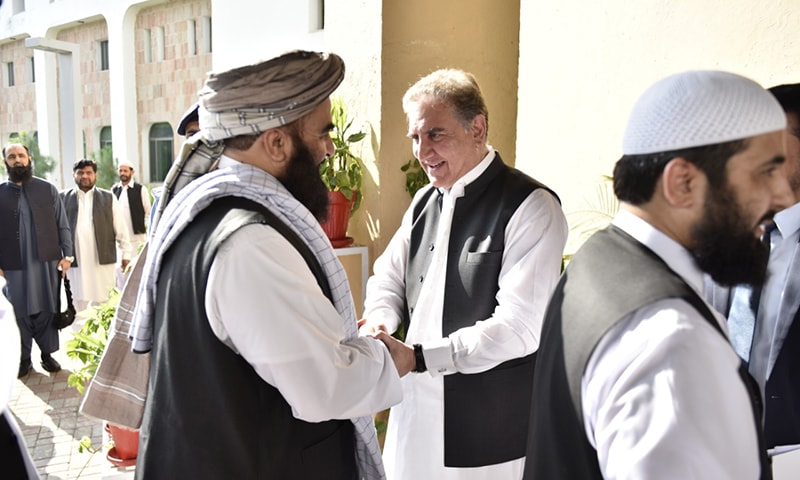Alwaght- Two weeks after an agreement was announced between the government and the Taliban negotiation delegations in Qatar on a roadmap to continue the peace talks, a high-ranking Taliban delegation led by Abdul Ghani Baradar made a two-day visit to Islamabad on Thursday to meet Pakistani officials.
Pakistan’s Prime Minister Imran Khan in his visit to Kabul on November 19 promised support to the advancement of the peace process and end of violence in Afghanistan. He assured the Afghan leaders that he will keep supporting the path of Afghanistan peace.
The people and government of Afghanistan have always looked at the Pakistan-Taliban relations with concern and pessimism. So, now all eyes in the war-weary country are focused on the Taliban’s meeting in Afghanistan and what the visit bears.
Alwaght arranged an interview with Pir-Mohammed Mollazehi, an expert of Afghanistan and Indian Peninsula affairs, asking questions surrounding the Taliban delegation visit and the peace process.
The first question was about the goal behind the visit of the Taliban figures to Pakistan. He said that after Doha agreement, the two sides decided that they need to put the negotiations on hold and return to their centers for consultations. The halt is now over 20 days. Having in mind that Islamabad has a sway over Quetta Shurra as a branch of the Taliban in Pakistan, it is expected that Mullah Baradar as the key negotiator of the Taliban in addition to consulting Quetta Shurra leadership will talk to the Pakistani officials and make the necessary coordination on the agenda of the talks in best interests of the militant group and Pakistan as political, military, logistical, and financial backer of the Taliban.
“The main goal of Mullah Baradar is that he wants to know about the Pakistani viewpoints. In other words, after 20 days of halting the dialogue, he needs to know what cases are red lines and what cases are negotiable.”
Touching on Pakistan's red lines and interests and their influence on the course of talks, Mr Mollazehi told Alwaght that Islamabad has several key issues in Afghanistan, the most important of which is Durand line. Islamabad wants the Afghans to recognize the border line that was drawn in 1893 under Emir of Afghanistan Abdur Rahman Khan between Afghanistan and the British India represented by Viceroy Mortimor Durand.
Mr Mollazehi continued that although since then five regimes with different ideologies, including the Taliban, ruled Afghanistan, none of them has recognized as credible this line. Rejecting this agreement means that Afghanistan lays claim to at least three regions of Tribal Region, Khybar Pakhtunkhwa, and Baluchistan province as its own.
“Have in mind that Baluchistan accounts for 47 percent of Afghanistan territory. Add to this the around 1,500 kilometers of sea borders in Mukhamaran region. When we consider the significance of the issue, of course Durand line would be Pakistan’s key concern.
Another red line for Pakistan is expansion of Indian influence in Afghanistan. The toehold now India has in Afghanistan is unacceptable for Pakistan as the latter thinks it is being encircled from the east and west. Therefore, blocking the Indian weight gain in Afghanistan is a strategic goal for Pakistan.
Another issue for the Pakistanis is easy access to the Central Asia via Afghanistan. To put it differently, Islamabad does not accept any restrictions on its trade with the Central Asia.
Moreover, Pakistan wants an aligned, if not puppet, government in Afghanistan.
Alwaght asked about the impacts of Pakistan's demands, having in mind that in the past few years Afghanistan has been after relations boost with India.
Mr Mollazehi held that if the Taliban are incorporated in Afghanistan power structure, they have the capability to create a balance in Kabul relations with Islamabad and New Delhi. It seems that behind-the-scenes agreement have been reached between Pakistan and the Taliban on this case.
India has made major investments in Afghanistan’s economy, including Salma Dam project on Harirud River, Afghanistan parliament building, and also Delaran Highway of Kandahar which is 2017 kilometers long with its own cash, not to mention the training of the Afghanistan air forces. These are strategic steps India takes to deepen its influence in Afghanistan. In response, Pakistan insists on training Afghanistan police and military forces in a push towards a balance with India. Islamabad insists on training the Taliban militants in Pakistan to be merged to the Afghanistan army.
“Also, there are secret things in the negotiations that are not given publicity. But in general Islamabad eyes a sort of balance in Afghanistan ties to Pakistan and India and also Afghanistan ties to Russia, China, and the West. Experience shows that Afghanistan reaches peace only if it keeps neutral in the competition of the regional and international actors. Under Mohammed Zaher Shah, Afghanistan had friendly ties to all parties but since Mohammed Davoud Khan plotted a coup in 1963 and leaned to the Soviets, Kabul faced Western reactions. When he shifted to the West, he triggered the Soviet reaction that culminated in a communist coup. This vicious circle needs to end before Afghanistan can meet stability and peace through a policy of neutrality.”



























